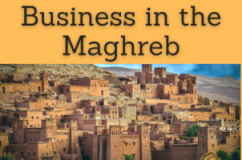Business in Tunisia. Tunisian Economy
Tunisia: exporter of dates. Tunisian Foreign Trade. Ports, Logistics
Tunisia is the first world dates exporter. Top tourist destination in the Mediterranean.
The Republic of Tunisia is strategically located at the crossroads of MENA region (North Africa and the Middle East) and the European Union.

- Introduction to the Republic of Tunisia (Maghreb)
- Tunisian Economy
- Tunisian International Trade
- Tunisian Multilateral agreements
- European Union-Tunisia Association Agreement
- Tunisian institutions
- Industry promotion Agency
- Export and Investment High Council
- General Directorate of Customs
- Investment in Tunisia
- Transport and Logistics
- Tunisian industrial sector
- Agribusiness
- Electricity
- Textile
- Leather
- Case Study - Tunisian enterprises:
- Mohamed Ali Harrath (Islam Channel)
- BENETTON Tunisia
- UNILEVER
- Danone and STIAL
- Tunisia Telecom
- Best Brands
- Confection Ideale du Sud CIS
- Access to the Tunisian Market
- Business Plan for Tunisia
International Trade and Business in Tunisia: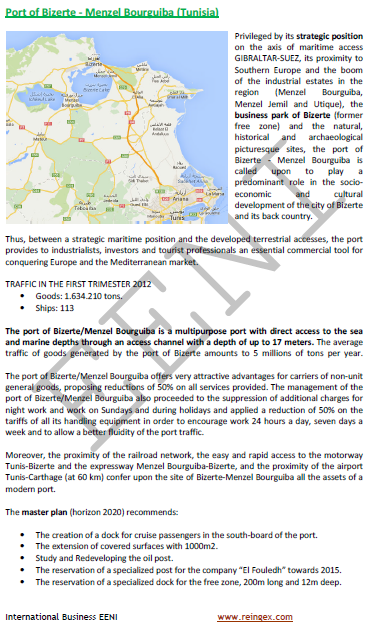

The educational aims of the Subject “Foreign Trade, Logistics and Business in Tunisia” are:
- To analyze the Tunisian Economy, Logistics and Global Trade
- To conduct research on business opportunities in Tunisia
- To explore the Tunisian trade relations with the student's country
- To learn about Tunisian Trade Agreements
- To examine the profile of Tunisian companies
- To develop a business plan for the Tunisian Market

The Subject “Foreign Trade, Logistics and Business in Tunisia” is included within the curriculum of the following academic programs at EENI Global Business School:
Doctorate: African Business, World Trade.

Masters: International Business, Foreign Trade.

Languages:  or
or  Tunisie
Tunisie  Túnez
Túnez  Tunisia.
Tunisia.
- Subject Credits “Doing Business in Tunisia”: 2

International Trade, Logistics and Business in Tunisia.



Tunisian Preferential Access and Trade Agreements:
- Tunisia and the Maghrebian Economic Area
- Arab Maghreb Union
- Community of Sahel-Saharan States (CEN-SAD)
- Common Market for Eastern and Southern Africa (COMESA)
- COMESA-EAC-SADC Agreement
- Arab Mediterranean Agreement
- Egypt-Jordan-Morocco-Tunisia / Agadir Agreement
- African Continental Free Trade Area
- Islamic Trade Preferential System
- Tunisia-EU
- Euro-Mediterranean Partnership
- European Union-Tunisia Agreement
- Africa-EU Partnership
- European Neighborhood Policy - Union for the Mediterranean
- Turkey-Tunisia Agreement
- Tunisia has Trade Agreements with Egypt, Morocco, European Free Trade Association (EFTA), Jordan, and Libya
- Greater Arab Free Trade Area (GAFTA)
- Global System of Trade Preferences
- Trade Negotiations Among Developing Countries
- Organization of the Black Sea Economic Cooperation (observer country)
Sample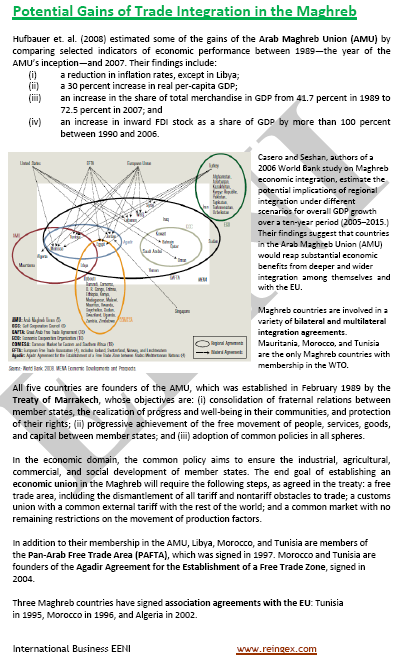

- World Trade Organization (WTO)
- Agreement on Sanitary and Phytosanitary Measures
- Agreement on Trade in Services (GATS)
- Agreement on Technical Barriers to Trade
- Agreement on Preshipment Inspection
- Agreement on Safeguards
- Trade Facilitation Agreement
- World Customs Organization (WCO)
- Kyoto Convention
- COTIF Convention (Rail)
- BIC
- Chicago Convention (ICAO)
- International Maritime Organization (IMO)
- Hamburg Rules
- Customs Convention on Containers
- CIM & CIT Rules (Rail Transport)
- International Road Transport Union (IRU)
- TIR Convention
- Guidelines on Safe Load Securing for Road Transport

- Economic Commission for Western Asia (ESCWA)
- Arab League
- Organization of Islamic Cooperation (OIC)
- Asia - Middle East Dialogue
- Summit of South America-Arab Countries
- Afro-Arab Cooperation
- Arab Bank for Africa (BADEA)

- Economic Commission for Africa
- African Union
- AU Convention on Preventing and Combating Corruption (not signed)
- AUDA-NEPAD
- African Development Bank
- Africa-Asia Partnership
- Africa-Korea Partnership
- Africa-BRICS
- Africa-Turkey Partnership

- World Bank
- United Nations
- World Trade Organization (WTO)
- International Monetary Fund
- Tunisian Capital: Tunis
- The largest Tunisian cities are Tunis, Sfax, Sousse, Kairouan, Bizerte and Gabes
- Area of Tunisia: 163,610 km²
- Tunisian Population: 11 million people
- Frontiers of Tunisia: Algeria and Libya
- Main languages: Arabic, French, and Berber
- Type of Government of Tunisia: Unitary Unicameral Parliamentary Republic
- Tunisian Currency: Tunisian Dinar (TND)
- Tunisian independence: March 1956 (from France)
- Abolition of Slavery in Tunisia: 1836
More information about Tunisia (EENI African Business Portal).
Religion in Tunisia:
- 98% of the Tunisian population follows Islam Sunni
- Fiqh (Islamic Jurisprudence): Maliki school
- Islam is the official state religion in Tunisia
Tunisia belongs to the Maghrebian Economic Area (Islamic Civilization and African Civilization).
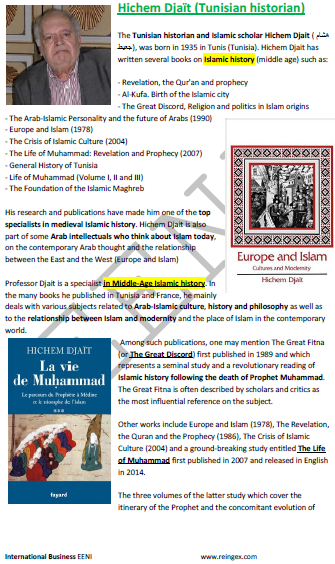
Tunisian Economy
- GDP of Tunisia
- Agriculture: 11%
- Industry: 35.3%
- Services: 53.7%
Tunis is the first economic and industrial centre of Tunisia (1/3 of the Tunisian enterprises and 1/3 of the Tunisian GDP).

- Top Tunisian export partners: The EU (France, Italy, Germany), Libya, and the United States
- Top Tunisian import partners: The EU (France, Italy, Germany, Spain), China, and Algeria
Sample: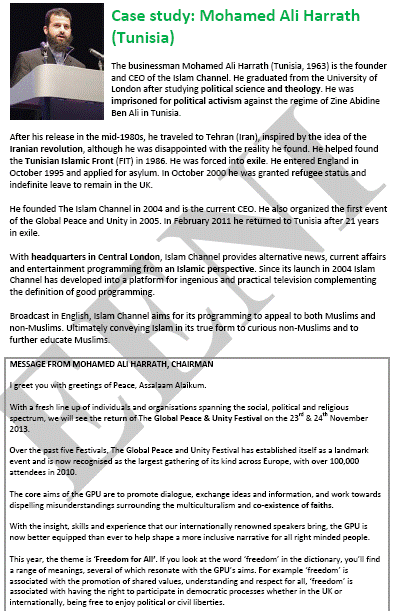
The Republic of Tunisia is the:
- First tourist destination in the Southern Mediterranean
- First world dates exporter
- Second-largest phosphoric acid and super-phosphate exporter
- Second-largest olive oil exporter after the European Union
- Fifth clothing products supplier to the countries of the European Union
- Fifth phosphate producer in the World
- Tenth EU wiring harnesses supplier
Sample: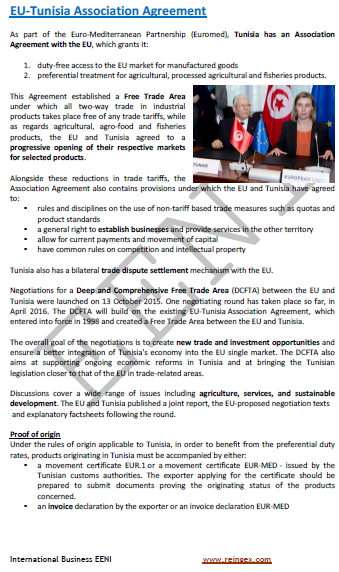
Foreign Trade Tunisia-EU.
- Exports of the Republic of Tunisia to the EU's market have grown significantly
- 80% of the Tunisian exports to the EU are industrial products
- The Republic of Tunisia is the fourth clothing exporter to the European Union
- Tunisia is an advantaged trading partner of the European Union
- In 1996, the Republic of Tunisia was the first nation on the south of the Mediterranean Sea to have a free trade zone with the EU markets
Sample: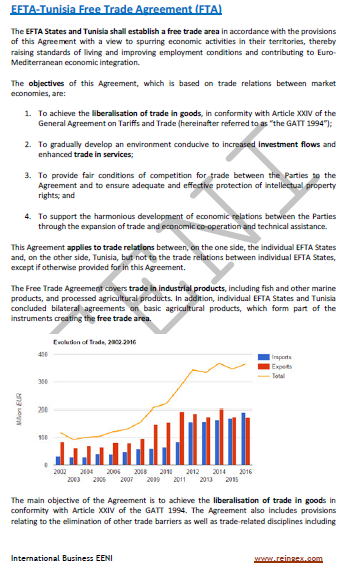
(c) EENI Global Business School (1995-2025)
Top of this page








 WhatsApp
WhatsApp